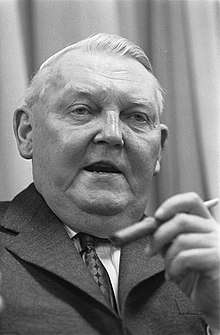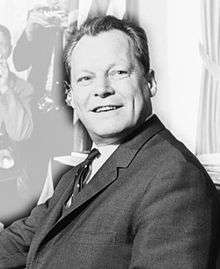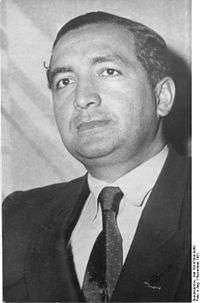1965 West German federal election
Federal elections were held in West Germany on 19 September 1965 to elect the members of the 5th Bundestag. The CDU/CSU remained the largest faction, while the Social Democratic Party remained the largest single party in the Bundestag, winning 251 of the 518 seats (including 15 of the 22 non-voting delegates for West Berlin).
| |||||||||||||||||||||||||||||||||||||||||||||
All 518 seats in the Bundestag 260 seats needed for a majority | |||||||||||||||||||||||||||||||||||||||||||||
|---|---|---|---|---|---|---|---|---|---|---|---|---|---|---|---|---|---|---|---|---|---|---|---|---|---|---|---|---|---|---|---|---|---|---|---|---|---|---|---|---|---|---|---|---|---|
| Registered | 38,510,395 | ||||||||||||||||||||||||||||||||||||||||||||
| Turnout | 33,416,207 (86.8%)[2] | ||||||||||||||||||||||||||||||||||||||||||||
| |||||||||||||||||||||||||||||||||||||||||||||
 Results by constituency for the first votes. Grey denotes seats won by the CDU/CSU; red denotes seats won by the SPD. | |||||||||||||||||||||||||||||||||||||||||||||
| |||||||||||||||||||||||||||||||||||||||||||||
Campaign
Federal Chancellor Ludwig Erhard was initially popular as the acclaimed "father" of West Germany's economic miracle of the 1950s and early 1960s. West Germany's economy still seemed solid in 1965, and thus not enough West German voters wanted to change the party of Federal Chancellor. To ensure his victory in this Bundestag election, Erhard promised to cut income tax and to increase social program spending.[3][4]
Results
| Parties | Constituency | Party list | Total seats | |||||||||||||
|---|---|---|---|---|---|---|---|---|---|---|---|---|---|---|---|---|
| Votes | % | +/− | Seats | +/− | Votes | % | +/− | Seats | +/− | Seats† | +/− | % | ||||
| Social Democratic Party (SPD) | 12,998,474 | 40.1 | +3.6 | 94 | +3 | 12,813,186 | 39.3 | +3.1 | 108 | +9 | 217 | +14 | 41.9 | |||
| Christian Democratic Union (CDU) | 12,631,319 | 38.9 | +2.6 | 118 | +4 | 12,387,562 | 38.0 | +2.2 | 78 | ±0 | 202 | +1 | 39.0 | |||
| Christian Social Union (CSU) | 3,204,648 | 9.9 | +0.2 | 36 | −6 | 3,136,506 | 9.6 | ±0 | 13 | +5 | 49 | −1 | 9.5 | |||
| Free Democratic Party (FDP) | 2,562,294 | 7.9 | −4.2 | 0 | ±0 | 3,096,739 | 9.5 | −3.3 | 49 | −18 | 50 | −17 | 9.7 | |||
| National Democratic Party (NPD) | 587,216 | 1.8 | +1.8 | 0 | ±0 | 664,193 | 2.0 | +2.0 | 0 | ±0 | 0 | ±0 | 0 | |||
| German Peace Union (DFU) | 386,900 | 1.2 | −0.6 | 0 | ±0 | 434,182 | 1.3 | −0.6 | 0 | ±0 | 0 | ±0 | 0 | |||
| Action Community of Independent Germans (AUD) | 46,146 | 0.1 | +0.1 | 0 | ±0 | 52,637 | 0.2 | +0.2 | 0 | ±0 | 0 | ±0 | 0 | |||
| Christian People's Party (CVP) | 11,978 | 0.0 | +0.0 | 0 | ±0 | 19,832 | 0.1 | +0.1 | 0 | ±0 | 0 | ±0 | 0 | |||
| Free Social Union (FSU) | 6,287 | 0.0 | +0.0 | 0 | ±0 | 10,631 | 0.0 | +0.0 | 0 | ±0 | 0 | ±0 | 0 | |||
| Independent Workers' Party (UAP) | 1,127 | 0.0 | +0.0 | 0 | ±0 | 3,959 | 0.0 | +0.0 | 0 | ±0 | 0 | ±0 | 0 | |||
| European Federalist Party (EFP) | – | – | – | – | – | 1,015 | 0.0 | +0.0 | 0 | ±0 | 0 | ±0 | 0 | |||
| Electoral groups and independents | 660 | 0.0 | ±0 | 0 | ±0 | – | – | – | – | – | 0 | ±0 | 0 | |||
| Invalid/blank votes | 979,158 | — | — | — | — | 795,765 | — | — | — | — | — | — | — | |||
| Totals | 33,416,207 | 100 | ±0.0 | 248 | +1 | 33,416,207 | 100 | ±0.0 | 248 | -4 | 518 | -3 | ±0 | |||
| Registered voters/turnout | 38,510,395 | 86.8 | — | — | — | 38,510,395 | 86.8 | — | — | — | — | — | — | |||
| Source: Federal Returning Officer | ||||||||||||||||
- ^† — includes the non-voting delegates for West Berlin (15 SPD, 6 CDU, 1 FDP).
| 251 | 50 | 217 |
| CDU/CSU | FDP | SPD |
Aftermath
The coalition between the CDU/CSU and the FDP returned to government, with Ludwig Erhard as Chancellor. In 1966, the FDP left the coalition over budget issues, and Erhard resigned. Kurt Georg Kiesinger (also CDU) formed a new grand coalition between the CDU/CSU and the SPD which lasted until the next election.
Notes
- Erhard succeeded Konrad Adenauer as federal Chancellor on 16 October 1963; he did not become leader of the CDU until 1966.
References
- "Wahl zum 5. Deutschen Bundestag am 19. September 1965" (in German). Bundeswahlleiter. Archived from the original on 6 May 2012. Retrieved 6 May 2012.
- "Voter turnout by election year". Website of the Federal Returning Officer's Office. The Federal Returning Officer. Archived from the original on 7 November 2014. Retrieved 7 November 2014.
- Bjöl, Erling. "Erhard's Victory and Fall". Grimberg's History of the Nations, volume 23: The Rich West. p. 339.
- Bark, Dennis L.; Gress, David R. (1989). A History of West Germany, volume 2: Democracy and Its Discontents, 1963–1988. London, UK: Basil Blackwell.


